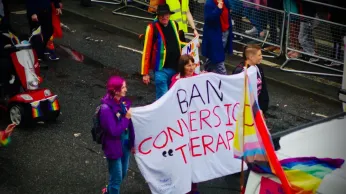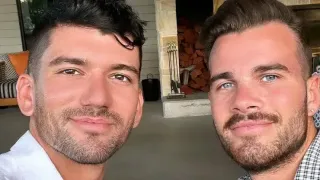
2 hours ago
Nearly 200 Lawmakers Urge SCOTUS to Uphold Colorado’s Conversion Therapy Ban
READ TIME: 4 MIN.
A broad coalition of 187 Democratic members of Congress has joined together to file a friend-of-the-court brief urging the U.S. Supreme Court to uphold Colorado’s ban on conversion therapy for minors. The case, Chiles v. Salazar, now before the Supreme Court, challenges the constitutionality of Colorado’s 2019 law that prohibits licensed mental health professionals from attempting to change a young person’s sexual orientation or gender identity—a practice widely denounced by the medical community as both harmful and ineffective .
The amicus brief was spearheaded by U.S. Representative Mark Takano, chair of the Congressional Equality Caucus and the first openly gay person of color elected to Congress, alongside Representative Ted Lieu of California and Senator Jeff Merkley of Oregon, all Democrats . In their submission, the lawmakers argue that the Colorado law is a necessary protection for LGBTQ+ youth, who are particularly vulnerable to the documented harms of conversion therapy.
“Conversion therapy has been widely discredited by every major medical and mental health organization in the United States. Allowing this practice to continue puts countless LGBTQ+ youth at risk for depression, anxiety, and even suicide,” Rep. Takano said in a statement released with the filing .
The case was brought by Kaley Chiles, a licensed professional counselor in Colorado, who argues that the state’s ban violates her First Amendment rights to free speech and the free exercise of religion. Chiles, represented by the Alliance Defending Freedom—a conservative Christian legal organization known for challenging LGBTQ+ protections—contends that her counseling services, which she believes align with her religious convictions, are unfairly restricted by the law .
The Colorado law, however, specifically applies to licensed mental health professionals and includes exemptions for religious ministry. The law was enacted in 2019 in response to overwhelming evidence and consensus among professional organizations that conversion therapy is both ineffective and dangerous for minors .
Lower courts have consistently upheld the Colorado law. In 2024, the U.S. Court of Appeals for the Tenth Circuit affirmed a district court decision, ruling that the law regulates professional conduct—not protected speech—by prohibiting a specific, discredited therapeutic practice . The Tenth Circuit found the law to be a legitimate exercise of state power aimed at protecting minors from harm and maintaining the integrity of the mental health profession .
In their ruling, the court noted that the law survives rational basis review, the standard applied because the regulation targets professional conduct, not the content of speech. The court cited substantial evidence demonstrating conversion therapy’s lack of efficacy and its potential to cause significant psychological harm .
Major medical organizations, including the American Medical Association, the American Psychiatric Association, and the American Academy of Pediatrics, have all denounced conversion therapy as both unethical and dangerous. The overwhelming consensus is that attempts to change a person’s sexual orientation or gender identity can lead to increased rates of depression, anxiety, substance abuse, and suicide among LGBTQ+ youth .
These findings were central to Colorado’s decision to enact its ban, joining 23 other states and the District of Columbia in prohibiting the practice by licensed professionals .
The lawmakers’ amicus brief argues that protecting minors from conversion therapy is a compelling state interest and that states have a long-standing role in regulating the conduct of licensed professionals to ensure client safety. The brief emphasizes that professional speech is distinct from private speech; while the First Amendment protects individual expression, it does not prevent states from restricting harmful, discredited practices in the context of licensed counseling .
Representative Lieu, himself an author of California’s first-in-the-nation conversion therapy ban, noted, “We must not allow dangerous pseudoscience to masquerade as legitimate healthcare. Our laws should protect children, not subject them to practices known to cause harm” .
The Supreme Court’s forthcoming decision in Chiles v. Salazar has the potential to shape LGBTQ+ youth protections nationwide. Should the Court strike down Colorado’s law, similar bans in more than 20 states could be jeopardized, potentially opening the door for a revival of conversion therapy practices .
LGBTQ+ advocates warn that a ruling against Colorado could have devastating effects. Amit Paley, CEO of The Trevor Project, an LGBTQ+ youth crisis intervention and suicide prevention organization, said, “The Supreme Court’s decision will not only affect the lives of LGBTQ+ youth in Colorado but will send a message to young people across the country about whether their lives and identities are valued and protected” .
While the plaintiff has argued that the ban infringes upon religious freedoms, the law clearly exempts religious leaders and unlicensed individuals acting in a religious capacity. The challenge centers on whether the state can regulate the practices of licensed professionals who provide mental health care to minors .
Legal experts note that states regularly impose professional standards and restrict practices deemed unsafe or unethical, regardless of an individual provider’s personal or religious beliefs .
As the Supreme Court prepares to hear oral arguments, the eyes of the nation—and particularly those of LGBTQ+ advocates and families—are fixed on the outcome. The Court’s decision could either reaffirm the authority of states to protect young people from dangerous practices or, conversely, roll back years of progress in LGBTQ+ mental health protections.
In the meantime, advocacy organizations urge continued vigilance and support for LGBTQ+ youth, emphasizing that the fight for equality and safety in healthcare is far from over .






